DfT prepares to expand its heavy truck test regime but observers cast doubts over tester availability and facility suitability. John Lewis reports.
A broad assortment of specialised heavy trucks that have hitherto escaped annual testing are about to be swept up in the eager ‘net’ of the Department for Transport (DfT).
It is all thanks to a change in laws governing roadworthiness requirements set to come into force this year.
The new regime will come into effect on May 20 following amendments to the Good Vehicles (Plating & Testing) Regulations 1988 and will impact fleets run by construction companies and the public utilities in particular.
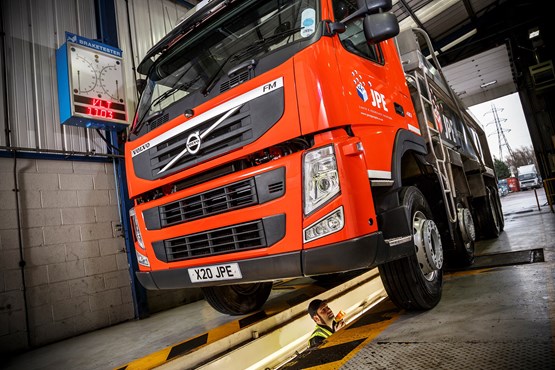
“Approximately 30,000 vehicles will be affected according to the DfT,” says James Firth, head of licensing policy at the Freight Transport Association (FTA).
The nine categories of truck which will come under scrutiny include concrete mixers (in the DfT’s sights for some years), breakdown vehicles, mobile cranes, tower wagons, various types of mobile plant and certain previously-exempt trucks and trailers involved in road construction.
Given the rising interest in zero-emission vehicles it is interesting to note that electric trucks registered since March 1, 2015, are also on the list.
The DfT first proposed the changes in December 2014. It argued that there was no reason why vehicles based on truck chassis should not undergo annual testing unless there was a clear reason why it was not practical or proportionate.
READ MORE: Anger as DfT approves Ashford Borough Council HGV parking fine increase
“From a practical perspective, increased standardisation of design has meant many formerly special and supposedly un-testable vehicles are no different from conventional heavy goods vehicles,” contends transport minister Jesse Norman.
“It is important the regulatory regime keeps up as the vehicles used on our roads develop and adapt.”
However, it is a moot point as to whether all test centres will be able to accommodate some of these special trucks and trailers, despite what the minister says.
In certain cases their dimensions could make it difficult to get them through the doors and onto the test lane.
“It’s possible that some authorised testing facilities (ATFs) will struggle with them,” Firth says.
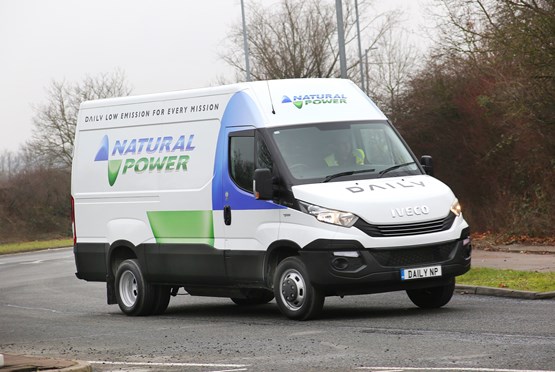
If so, then the Driver & Vehicle Standards Agency (DVSA) will designate one-off or occasional sites to handle the work, although it expects the requirement for them will be small.
If a full test is not possible due to the vehicle’s unusual design testers will still be expected to satisfy themselves that safety and environmental standards are being maintained.
In principle, all the vehicles involved will have to be plated. “However, we are aware that in certain cases there may be difficulties in determining the plated weight,” the DfT says.
“We therefore intend to amend the regulations to give the DVSA some discretion in determining whether these vehicles can undergo a roadworthiness test without a plate,” the government department adds.
Firth is worried ATFs are being asked to do more at a time when the DVSA apparently does not have enough testers available to handle the existing workload.

“Our members are greatly concerned,” he says. “The DVSA says it is aware of the problem and that capacity exists, but not in the right places.”
Heavy haulage trucks operating under the Road Vehicles (Authorisation of Special Types) General Order 2003 (STGO) Regulations, or Vehicle Special Orders as provided for by Section 44 of the Road Traffic Act 1988 remain exempt from annual testing.
“So do vehicles constructed or adapted for, and used primarily for the purpose of, medical, dental, veterinary, health, educational, display, clerical or experimental laboratory services,” says the DfT.
Never let it be said the current Government lacks a sense of fun. Trucks used to haul funfairs and circuses around will stay exempt from yearly testing, too.
One change that will not be as painful as O-licence holders may have feared is in the financial standing requirement they must adhere to.
READ MORE: Hitachi Capital awarded Commercial Fleet's van/truck contract hire and leasing company of the year
The figures come into force on January 1 each year and are in place for 12 months.
The idea is to ensure that operators have enough money to keep their trucks roadworthy.
At the time of writing, standard licence holders were required to have funds they could call on amounting to £7,850 for their first truck and £4,350 for each one thereafter.
For restricted licence holders, the amounts were £3,100 and £1,700 respectively.
Restricted licence holders seldom face a change as the sums they need to have to hand are determined by the UK Government, says Firth.
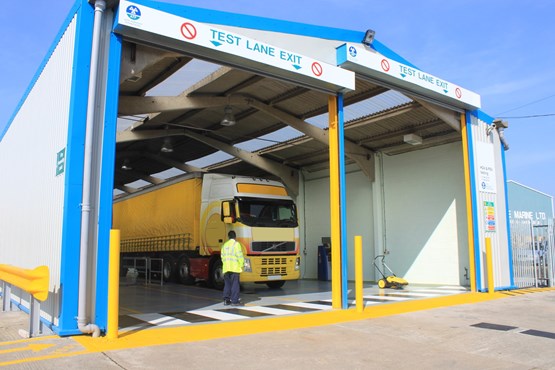
For standard licence holders the situation is different because the amounts are determined by the European Commission, and set in euros; and sterling has, of course, fallen sharply against the euro in the wake of the Brexit vote.
“Fortunately, it enjoyed a slight upwards surge at the start of October when the exchange rate used was set so the impact shouldn’t be too great,” says Firth. “There was some concern the figures might rise steeply.”
Something that will affect all fleet operators no matter whether they hold an O-licence or not begins this year – GDPR: the General Data Protection Regulation.
Voted into EU law by the European Parliament on April 14, 2016, and replacing the Data Protection Act 1998, it comes into force on May 25 and applies to the UK regardless of the Brexit vote.
“It covers personal data held by businesses on employees as well as customers,” Firth says.
READ MORE: Mercedes-Benz Trucks awarded best truck innovation of the year at Commercial Fleet Awards 2017
Paul Currie, a partner at DFA Law, told delegates at the 2017 Microlise Transport Conference: “A lot of telematics data which transport companies hold or is held by third parties on their behalf will be classed as personal data and within GDPR’s scope.”
The legislation imposes tougher requirements on firms to protect such information with hefty fines imposed for breaches, which will be less easy to defend, Currie warns.
A fine of up to €20 million (approximately £17.5m) or up to 4% of a company’s global turnover in the previous financial year, whichever is the greater, can be levied.
IT consultancy Bluesource makes says a firm could also face civil litigation from individuals who have suffered damage because data about them was made public.

“Picture a scenario where your company is hired by a NHS Trust or health charity to deliver home treatment therapies to individuals with serious long-term medical conditions such as HIV,” it says.
“Should the worst happen and your delivery list is somehow leaked online through negligence, malice or human error, then the fall-out could be huge.
“GDPR means you will be expected to have systems in place to minimise breaches and you will need more processes and formal procedures than you are likely to have in place currently,” it adds.
“I would recommend the appointment of a data protection officer so far as most organisations are concerned.”
Risk management consultancy Willis Towers Watson says companies will be given a time window of no more than 72 hours to report a breach if individuals affected are likely to be put at risk.
“The role of the data protection officer should not be taken lightly,” it states.
“It is not a nominal position to satisfy regulation and it must extend beyond the realm of IT.
READ MORE: Iveco Stralis NP awarded low carbon truck of the year at 2017 Commercial Fleet Awards
"Officers should be well-versed in data, risk, law and compliance but also able to adapt to the ever-changing risk landscape of a modern digital world.
"At a time when many transportation companies are struggling to attract and retain top talent, this is not a simple ask.”
The International Association of Privacy Professionals estimates at least 28,000 data protection officers will be required across Europe so competition will be fierce and a skills shortage may emerge.
Legislation is obliging truck makers to fit more new safety systems to their vehicles and make improvements to those already installed.
The mandatory installation of Advanced Emergency Braking Systems (AEB) is a prime example.
Level 1 AEB became compulsory on all new trucks first registered from November 1, 2015, under EC Regulations No. 661/2009 and 347/2012.
Level 2 AEB, which mandates more demanding levels of deceleration, comes into force next autumn on trucks first registered from November 1.
AEB is designed primarily to reduce the risk of trucks ploughing into the back of slow-moving motorway traffic.
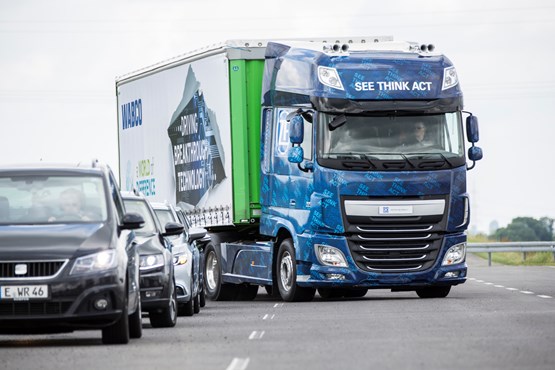
“Level 1 AEB is designed to avoid a collision between a vehicle travelling at 80kph (50mph) with a vehicle ahead of it travelling at 32kph (20mph) by a speed reduction of at least 50kph (31mph),” explains Wabco vice president, engineering, Christian Brenneke.
“In the case of a stationary vehicle – a car at the tail-end of a traffic jam for example – it needs to reduce the speed by a minimum 10kph (6mph) at the time of impact.
“So far as Level 2 is concerned, it means that a vehicle travelling at 80kph should not impact one driving at a speed of at least 12kph (7.5mph),” he adds. “The mandatory speed reduction will be increased to 70kph (43mph).
“The required speed reduction so far as a stationary vehicle is concerned will be increased to 20kph (12.5mph).”
Turning to emissions, consultation on a Government proposal to increase the gross weight of vehicles propelled by alternative fuels that can be driven by standard Category B licence holders from 3.5 to 4.25 tonnes will become law.
The aim is to offset the higher burden imposed by the powertrain fitted to environmentally-friendly gas and electric vehicles so they can carry the same weight as a diesel 3.5-tonner.
“It has always seemed nonsensical that companies keen to implement innovative technology that is better for the environment should be penalised on payload and have to pay for additional driver training,” says Iveco alternative fuels director Martin Flach.
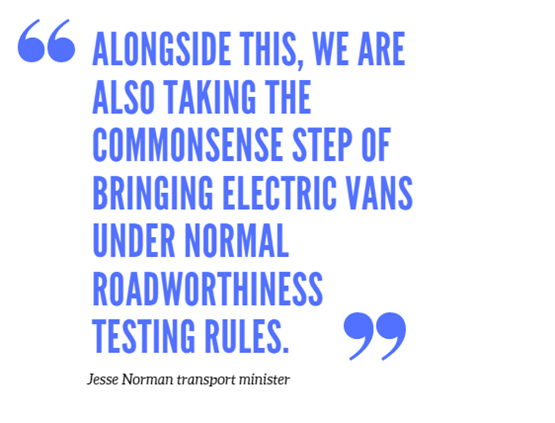
The Government agreed and fleets will now be able to run alternative-fuel vans up to 4.25 tonnes without requiring an O-licence.
Jesse Norman said: “We have decided to proceed with those plans in order to help incentivise the use of cleaner fuel vans, while avoiding the regulatory payload penalty associated with heavier powertrains.”
He added: “Alongside this, we are also taking the commonsense step of bringing electric vans under normal roadworthiness testing rules.”
Looking ahead, a piece of proposed European legislation that is starting to loom large is the European Commission’s ‘Mobility Package’ announced early last summer.
Consisting of eight legislative files and various accompanying documents, it includes proposals which would change the rules governing Drivers’ Hours, O-licensing, tachographs and the rules governing minimum wage rates for drivers from one European Union member state working in another.
None of these proposals are likely to come into force until after March 2019, when Britain should no longer be an EU member.
However, the British Government may decide to include part or all of the package in domestic law with an eye to maintaining parity with EU standards.
“We’re advising our members that any, or even all, of these proposals could come into force in the UK once adopted in Europe and we’re suggesting they plan accordingly,” says FTA chief executive David Wells.
One consequence could be a lowering of at least some aspects of O-licence legislation to below 3.5 tonnes.
Operators who regularly go in and out of the capital will be aware the central London Ultra-Low Emission Zone (ULEZ) will come into force on April 8, 2019; 17 months earlier than initially envisaged.
It will operate within the same area as the current Congestion Charging Zone. However, mayor Sadiq Khan’s office has stated that it will consult on extending the zone to the North and South Circular roads for vans and to the whole of the capital for trucks.
READ MORE: BT Fleet Solutions awarded van/truck management company of 2017 at Commercial Fleet Awards
Operators of trucks which do not meet Euro 6 will be obliged to pay a £100 charge per vehicle per day, with a £1,000 fine if they fail to do so. Diesel vans which do not comply with Euro 6 will attract a £12.50 daily charge.
The Direct Vision Standard (DVS) will follow in 2020. Transport for London (TfL) plans to rate trucks according to the level of direct vision from the driving seat, the idea being that whoever is behind the wheel should find it as easy as possible to see vulnerable road users such as cyclists and pedestrians.
Trucks will be given a rating from zero, which will be the lowest, to five stars, the highest. Models with a zero rating will be banned from London’s streets from 2020 onwards while at least three stars will be mandatory come 2024.
A Safety Permit Scheme is being mooted, however, which would allow trucks that would otherwise be barred from 2020 onwards to be allowed to enter London if they have cameras and sensors fitted.
The latest version of DVS was out for consultation at the time of writing.
The continued uncertainty over what DVS will entail means operators are unsure of exactly what to buy. “That makes life really difficult for them if they need to make their procurement decisions now,” Firth observes.
Both developments are major causes of concern to Road Haulage Association (RHA) members says policy director, Duncan Buchanan, as are the Clean Air Zones (CAZs) scheduled for introduction in major cities UK-wide.
Combined, they could have a serious impact on the secondhand value of trucks that were acquired as recently as 2014.
READ MORE: DfT report shows longer semi-trailers continue ‘to significantly reduce HGV miles’
“They are potentially undermining the value of Euro 4 and Euro 5 vehicles and the implications for our members are very serious,” Buchanan says.
If they cannot get a decent price for the trucks they already own, he points out, then it is unlikely they will be able to afford new ones with Euro 6 technology.
“It is wrong to destroy the value of peoples’ property retrospectively,” he states. “Yet that is what could happen.”
RHA chief executive Richard Burnett says: “More than half the UK’s truck fleet will not meet Euro 6 when the ULEZ is introduced.
"Bringing the date forward 17 months is little more than a means of bringing in revenue to cover the mayor’s other plans for London.”
FTA head of policy for London Natalie Chapman believes that introducing the ULEZ earlier than anticipated fails to take into consideration the huge strides the freight industry has made in meeting new emission standards.
“The mayor has not taken into account the time businesses need to comply with these new regulations without incurring significant costs that could put a real strain on their overheads and long-term security,” she says.
“It’s simply a tax on freight which will have repercussions for business profitability and longevity at a time when we believe the sector deserves support to continue its efforts to achieve ever-cleaner air for the city.”
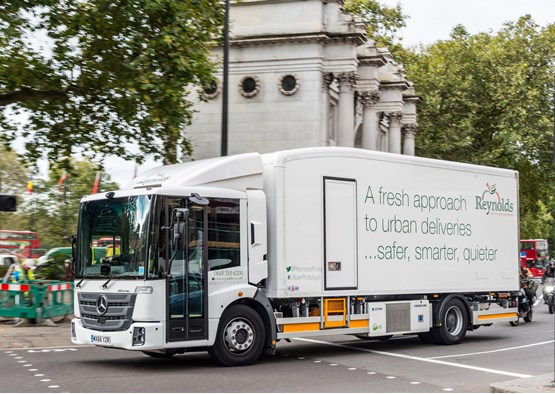
Traffic Commissioners’ priorities
Truck operators who fail to ensure their vehicles’ brakes are tested regularly and thoroughly are likely to receive short shrift from traffic commissioners if they appear before them during the next 12 months and thereafter.
That is the clear warning issued by lead traffic commissioners for enforcement Sarah Bell and Kevin Rooney and by their colleagues.
They have made their intervention, they say, because the issue of either poor brake testing or no testing at all is arising far too frequently during investigations by DVSA enforcement officers.
That is despite the lessons that should have been learned from the horrific crash in Bath, when the failure of badly-maintained brakes on an eight-wheel tipper resulted in fatalities.
Where tests are being conducted, in all too many cases they are not being conducted frequently enough, Bell and Rooney contend.
Furthermore, the results cannot be assessed properly because either insufficient or no data whatsoever has been recorded.
The DVSA Guide to Maintaining Roadworthiness says every safety inspection of a truck or trailer must include a metered assessment of its braking performance.
Ideally that should involve a roller brake tester, says the guide, but a decelerometer can be used instead to test vehicles without trailers.
Both types of equipment can measure overall braking efficiency but a roller brake tester can additionally measure the efficiency of individual brakes.
“Operators should carry out an urgent review of their brake testing regime now,” say Bell and Rooney.
“This should include an analysis of safety inspection records over the past 15 months, looking at whether the type of test and the information recorded is sufficient.
“O-licence holders must ensure their brake tests are planned in line with DVSA guidance and satisfy themselves that the vehicles and trailers running under their licence are roadworthy,” they add.
Brake testing was highlighted by Richard Turfitt on his appointment as senior traffic commissioner last April.
“We have to support responsible, compliant operators and drivers and focus our scrutiny on those who pose serious risks to safety standards,” he says.
Yet although the traffic commissioners remain unyielding in their determination to enforce the rules, increasingly it will only be the most flagrant and persistent examples of rule-breaking that will be subject to a public inquiry says a spokesman for the traffic commissioners’ office.
“What we’re trying to do is make more use of preliminary hearings,” he says.
“The idea is to say to the individual ‘there are some issues here and we need to discuss them.
“In this sort of situation we’re not talking about penalties such as revocation. Disciplinary action can be taken, but only with the operator’s agreement.
"If serious concerns arise, however, then the case could go on to a public inquiry.
“Another approach is for the traffic commissioner manager to talk to the individual and find out what’s been going on.
"He or she can then report back to the commissioner who will determine if further action needs to be taken.”
Such an approach should contribute to a more efficient way of working but without diluting enforcement or jeopardising safety.
The traffic commissioners say one of their two key strategic objectives over the next 12-to-18 months is to deliver a modern, effective O-licence regime that ensures operators are fit to hold a licence while minimising the regulatory burden on the compliant.
Their aim is for decisions on applications made by compliant operators to be made in no more than four weeks by April 2019 and for all licensing to be handled digitally by the same date.
The other is to promote a safe road transport industry which supports compliance and fair competition and protects the environment.
The conduct of drivers will not escape scrutiny in the coming months, with mobile phone use and tailgating both flagged as areas of concern.
Last summer the vocational licence of one driver was suspended for 12 weeks after he was reported for two mobile phone and two speeding offences.
In a separate case, two drivers who were reported for tailgating on top of offences relating to records falsification had their professional driving bans extended.
“Tailgating is potentially dangerous in any circumstances, but tailgating in a truck is especially serious,” says traffic commissioner for Wales, Nick Jones.
“If it is brought to the attention of a traffic commissioner, then strong, albeit proportionate, action will be taken.”

















Login to comment
Comments
No comments have been made yet.